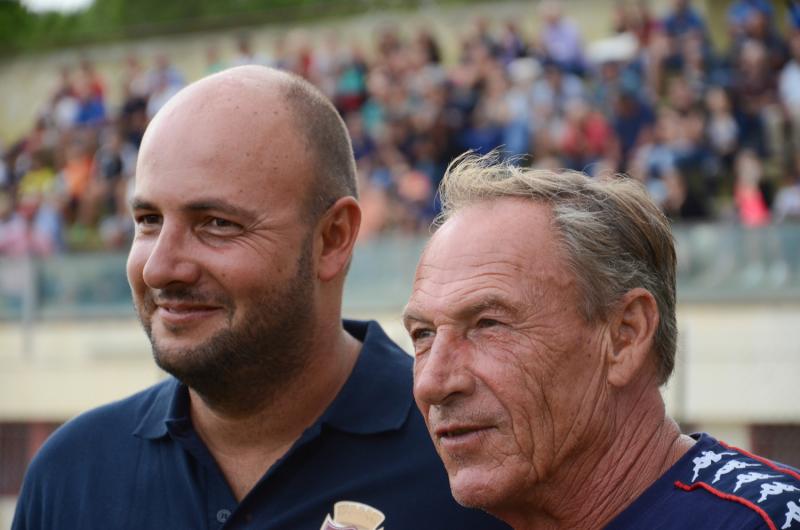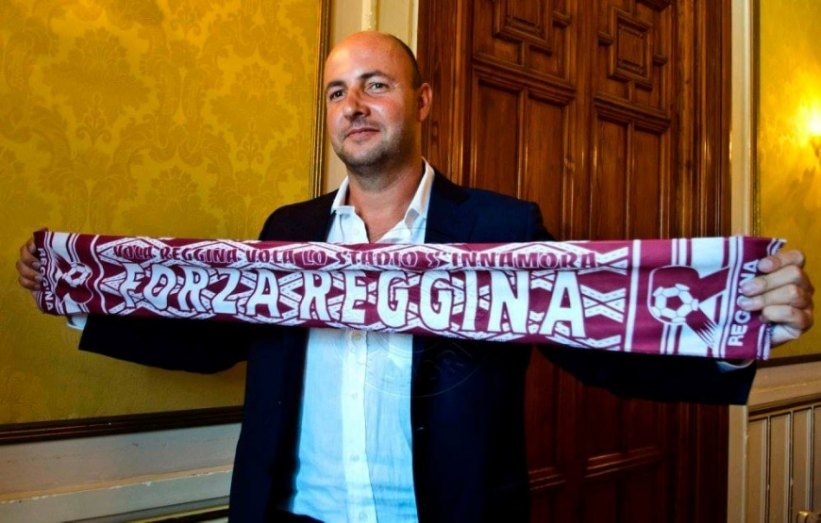The football world is well known for its father and son traditions. In the past there has been the glorious Maldini combination of Cesare and Paolo, both at AC Milan during their playing days, or Johann Cruyff’s legacy with his son Jordi.
In more recent times, Italian football has seen plenty of other father and son connections, in which the parent is a former great player and/or also a coach, while the son is a promising star on the field. Take Diego Simeone and his son Giovanni, who plays for Genoa; or the Di Francescos, with the father Eusebio coaching Sassuolo while his son Federico cuts his teeth at Bologna; and Fiorentina’s latest young jewel Federico Chiesa – son of former Sampdoria and Viola goal-scorer Enrico.
That being said, it’s not often one comes across a father and son pair in which both are coaching. But that’s exactly what we find when taking a trip to Lega Pro side Reggina, a former Serie A member striving to recover past glories. Coaching this side is Karel Zeman, son of the legendary Bohemian, Zdeněk Zeman.
In terms of his career choice, Karel has followed in his father’s footsteps, which is unsurprising given that he grew up in the spotlight of Zdeněk’s coaching career, chasing him up and down the Peninsula since childhood. Currently in charge of Reggina, Karel started his coaching journey alongside his father before joining ASD Bojano as first team head coach in 2007-08. This was the start of Karel’s personal pilgrimage around Italian football’s lower tiers, aspiring to carve out a path separate to that of his esteemed father.
Karel’s journey has also seen him coach amateur teams such as Toma Maglie and Manfredonia (where he coached a team located just few kilometers away from Foggia, the place where his father’s legacy was born) before getting his first chance to prove he could coach at the professional level. That happened in March 2012, when Karel took over at Alma Juventus Fano 1906, in the now defunct Serie C2 (fourth professional tier).
Karel started well, leading Fano to safety. However, he was sacked the following season following a 6-0 home defeat to Alessandria.
After an overseas experience at the helm of Maltese Premier League side Qormi, he returned to Italy, accepting the offer of Serie D side Selargius. Despite a short-lived and rather unsuccessful spell with the Sardinian outfit, Karel moved on and in December 2015, took over another Serie D side, Abano. After steadying the previously relegation threatened club, he was offered the head coaching role at Reggina.
Just like his father, Karel Zeman’s career has not just been Rose e Fiori (roses and flowers), and he has tasted the sack during a number of coaching tenures. He experienced this bitter disappointment with Manfredonia and Fano, while he was dismissed and then recalled by Toma Maglie, and he resigned at Bojano and Selargius.
However, these setbacks have not tempered Karel’s hope of becoming a top manager, nor diminished his love for coaching. He likes his teams to play an attacking brand of football based on an offensive 4-3-3 formation, a tactical system which is a true Zeman trademark. And while the spotlight remains fixed firmly on his father, especially after Zdeněk’s return to the coaching hot-seat at Pescara, it seemed high-time to explore the blossoming career of his son by speaking to Karel himself.
How positive has your experience in Reggio Calabria been thus far?
The [club’s] aim is to remain in this division and, at the moment, we are on course to achieve this result. We also want to achieve results by playing an entertaining and organised brand of football. It seems to me that, even amid ups and downs, we are succeeding.
You are a professional coach and that is your full-time occupation, but previously you coached both professionals and amateurs. What are the main differences?
Truth be told, [there are] few differences between the players. The bigger differences are between the clubs, with professional clubs having a much better structure allowing you to better apply your own methods and playing-style.
What are the main difficulties you encountered when coaching amateur clubs?
The difficulties always relate to the running of the clubs. Often, clubs are unable to pay the players the way they promised and as a result, players are less motivated to train, especially when they face a different kind of work from what they are used to. [Karel’s training sessions are as demanding and intense as Zdeněk’s]
What about your experience in Malta?
Even there, the top three or four clubs aside, the others are managed in an amateur way. The level is still good, and better than our amateur leagues in Italy. The first 3-4 teams could do well in Italy’s Serie B, while the others are good enough to compete at Lega Pro level.
Was it difficult starting your coaching career carrying the pressure of the Zeman name on your shoulders?
It was not so difficult because I don’t think of myself purely in terms of being ‘the son of… [Zeman]’. It annoys me to be considered solely as ‘the son of…’, although I think it is normal for people to see it that way.
What distinguishes you from your Father?
I learned everything from him. I followed his training and games since I was a little kid. I do not like to copy him. Some of my methods are different but the concepts are the same. The main difference between me and my father? I have not yet had access to the quality of players that he has [laughs].
What do you feel that you need to do to emerge from your father’s shadow?
I need to find the right team. I was very lucky to arrive at Reggina this year; it is a well-respected club.
Will you remain in Reggio next season?
It’s [too] early to say. At the end of the season, both I and the club will have to be satisfied and then the decision will be made whether we continue together.
Do you seek advice or guidance from your father?
Yes, that’s normal. Everyone gives advice to coaches [laughs]. I’ve given advice to him in the past, and now that he has more free time [it is] he who gives it to me.
Is there something different about your 4-3-3 formation compared to that of your father?
The formation I use is very similar, but the differences lie in how successfully we are able to implement the system in practice. In the divisions I’ve coached, the players tend to be focused on covering the spaces more than attacking. As a result, for example, the defensive line is not so high and the wide-forwards sometimes play narrow and become fourth and fifth midfielders. This isn’t always how I originally want them to play, but it’s how the game develops.
What are your possession concepts? And what are your defensive principles?
During possession, I want the ball to be moved forward quickly, with as many players involved in the attacking phases as possible. When possession is lost, I want my players to press immediately and win the ball back as soon as possible, preferably in a zone high up the field and away from our goal.
How do you try and instill your concepts and transmit them to the players?
By using drills such as 11 versus 0 (actually 8 versus 0 because I remove the central defenders and the goalkeeper) [which enables players to rehearse and internalise attacking movements and phases]. I also use attack versus defence drills and guided games, in which I am able to intervene and transmit the way I want them to play.
Many clubs rely on former players as coaches: what do you think about that?
Good question … it is not (necessarily) true that those who have played also have the skill-set to lead a group.
How difficult has it been for you to get your coaching badge? What badges do you own right now?
I have a UEFA ‘A’ badge. It was difficult, because if you’re not invited by the clubs it is practically impossible to gain access to the coaching course. Me? I was invited by Pescara. I had already collaborated with them by observing practices and games, so I had an invitation from them that allowed me to take the ‘A’ course.
What are your goals for the future?
I want to continue doing the work I love until someone gives me the opportunity the realise my ambitions.
A Special thanks to Urbs Sportiva Reggina 1914 and its press office for the permission to speak to Karel Zeman. And thank you coach for your kindness, time and wisdom.


